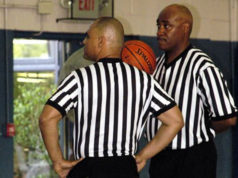As an official, when you are involved in a conflict, your goal is to resolve it. You have to fight the tendency to want to win the argument. It’s a subtle difference but critical to conflict management.
When resolving a conflict, the best outcome is when there are two “winners.” If there is only one winner, self-esteem and trust erodes in the loser. To avoid that, strive to keep an open dialogue and keep thinking about the words you choose and the way they impact the situation. There’s an old officiating saying that summarizes this philosophy: “As officials, we always have the last word. However, we don’t always have to say it.”
1. Permit the other person to talk without interrupting
Have the courtesy to listen before you say anything. It is then more likely that the other person will extend you the same courtesy. When both sides have been adequately heard, problem solving begins.
A Retired NL umpire Doug Harvey, one of the most respected ever to work in the profession, applied his “10-Second Rule.” He gave a manager who argued with him 10 seconds to vent before Harvey responded. His theory: The comments from the arguer were so emotional that his breath couldn’t last for more than 10 seconds. When he stopped to take a breath, Harvey could calmly begin his explanation.
2. Limit discussion only to the immediate issue that is adversely affecting your relationship
One of the fastest ways to get off to a bad start in solving a problem is to rehash the past or bring the discussion into other non-pertinent issues. A few coaches like to do that. You’ve got to “keep them in the box,” meaning keep them focused on the play or situation they are complaining about. Coaches may try to talk about things that happened earlier in the game. When they do that, say something like, “Let’s focus on this play and get it resolved. Now, how did you see this play?”
3. Choose an optimal time to bring up and discuss problems
Many problems that compromise positive conflict resolution can be avoided by carefully choosing the time to discuss an issue. To find that time, approach the other person when you are both calm and free to talk. Dead-ball time, like during a timeout or between periods, is a great time for officials to talk to people. Keep the conversations focused and brief.
4. Judiciously avoid the other person’s vulnerabilities or emotional sensitivities
Everyone has personal vulnerabilities and it’s very tempting to hit below the belt. It is a sign of maturity to avoid those areas when engaged in conflict. A deliberate strike at a personal vulnerability is irrelevant as well as hurtful. It also invites a counterattack focusing on your areas of sensitivity. No one will trust you with emotionally sensitive information if you use it as a weapon whenever there is a problem. In other words, it is inappropriate for the official to counterattack. A testy umpire once shouted to a coach who had questioned a safe call in softball, “I see that white hair under your cap. You probably think your huge experience entitles you to second guess me.” Sarcasm is never a good instrument for promoting serenity.
Probably the biggest temptation to avoid is using a team’s record or game score as a weapon. When a team is losing in lopsided fashion and a coach or player is complaining about a call, it is very tempting to fire back with, “You’ve won only three games this year and you’re down a bunch today. Maybe you should start focusing on playing instead of officiating. You’ve got a lot of work to do.” While the premise behind that statement is true, saying it gets you in trouble. You’ve used a team’s vulnerability to your advantage, a bona fide taboo.
5. Regularly touch base with the other person
It is customary not to take the time to talk when things seem to be going well. If you don’t talk when things are going well, then angry interactions may be the only times when you connect with coaches and players. Make it a point to make periodic comments about the progress of the game, even if those remarks may be innocuous. Continuing dialogue is one of the best possible ways to avoid problems. That concept straddles a fine line too. You want lines of communication open with participants, but you can’t have a constant running dialogue with them. Talking should be limited to brief words at appropriate times, such as during a dead-ball interval. Keep in mind you are only sending the message that you are willing to communicate; you are not commenting on all facets of play.
Learn additional advanced techniques for resolving arguments and conflicts with Verbal Judo, available in the Referee Training Center store.
What's Your Call? Leave a Comment:
Note: This article is archival in nature. Rules, interpretations, mechanics, philosophies and other information may or may not be correct for the current year.
This article is the copyright of ©Referee Enterprises, Inc., and may not be republished in whole or in part online, in print or in any capacity without expressed written permission from Referee. The article is made available for educational use by individuals.
















